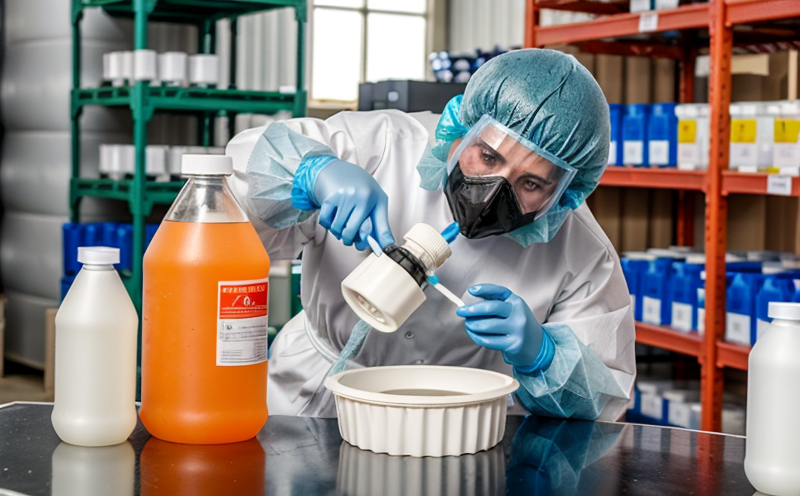EN 14476 Virucidal Testing of Packaging Contact Materials
The European standard EN 14476 specifies a method to determine the virucidal efficacy of packaging contact materials. This service is essential for ensuring that packaging materials used in the food and pharmaceutical industries can effectively inactivate viruses, thereby protecting public health and ensuring product integrity.
The test involves exposing viral inocula to the packaging material under controlled conditions over a specified period. The survival rate of the virus is then measured post-exposure. Materials with acceptable virucidal efficacy are deemed safe for use in direct contact with food or pharmaceutical products, minimizing the risk of contamination.
This service plays a critical role in the biopharmaceutical and packaging sectors, ensuring that materials used in manufacturing processes meet stringent regulatory standards. It is particularly important for manufacturers seeking to comply with international regulations such as ISO 11737-4:2019, which provides guidelines on microbiological safety testing.
The scope of the EN 14476 test includes various packaging materials like films, bags, and containers. The methodology involves inoculating the material with a specific virus strain (typically influenza A) and monitoring its inactivation over time. This process is conducted under standardized conditions to ensure reproducibility and reliability.
The standard also outlines acceptance criteria for virucidal efficacy. Materials must achieve at least a 4-log reduction in viral infectivity after exposure, ensuring a high level of safety. Compliance with EN 14476 not only enhances product quality but also strengthens brand reputation by demonstrating adherence to stringent hygiene and safety standards.
For quality managers, compliance officers, R&D engineers, and procurement teams, this service is indispensable. It ensures that packaging materials meet the highest standards of microbiological safety, thereby protecting public health and maintaining regulatory compliance. The test results provide critical data for ongoing product improvement and development.
The EN 14476 method has been widely adopted in industries where microbial contamination could lead to severe consequences. By ensuring virucidal efficacy, this service contributes significantly to the overall safety of packaged products, making it a cornerstone of modern manufacturing practices.
- Materials tested: Films, bags, containers
- Virus strain used: Influenza A (H1N1)
- Acceptance criteria: 4-log reduction in viral infectivity
- Testing duration: Variable based on material type and thickness
The service offers a robust framework for ensuring that packaging materials meet the highest standards of microbiological safety. By adhering to this standard, manufacturers can confidently produce safe and reliable products.
Scope and Methodology
The scope of EN 14476 encompasses the testing of packaging contact materials for their virucidal efficacy. This involves exposing the material to a viral inoculum under controlled conditions, monitoring the inactivation rate over time, and assessing compliance with acceptance criteria.
Materials tested include films, bags, containers, and other packaging components that come into direct contact with food or pharmaceutical products. The standard is particularly relevant for industries where microbial contamination could lead to severe health risks.
The methodology involves several key steps:
- Inoculation of the material with a specific virus strain (typically influenza A H1N1).
- Exposure of the inoculated material to controlled environmental conditions, including temperature and humidity.
- Monitoring viral infectivity at specified intervals.
- Evaluation against acceptance criteria for virucidal efficacy.
The test is conducted under strict procedural guidelines to ensure consistency and reliability. Compliance with EN 14476 not only enhances product quality but also strengthens brand reputation by demonstrating adherence to stringent hygiene and safety standards.
The service provides a comprehensive framework for ensuring that packaging materials meet the highest standards of microbiological safety, thereby protecting public health and maintaining regulatory compliance.
Quality and Reliability Assurance
Ensuring quality and reliability in virucidal testing is paramount. Here are some key measures employed to maintain high standards:
- Standard Operating Procedures (SOPs): Detailed SOPs are provided for each step of the test, ensuring that all personnel involved understand the procedures and follow them consistently.
- Calibration and Maintenance: Instrumentation used in testing is regularly calibrated to ensure accuracy. Equipment undergoes routine maintenance to prevent any potential errors.
- Quality Control Samples: Standardized quality control samples are tested alongside each batch of materials, providing a benchmark for consistent results.
- Data Validation: All data collected during testing is validated to ensure its accuracy and reliability. Any discrepancies are investigated thoroughly.
The service provider adheres strictly to international standards such as ISO 17025 for laboratory accreditation, ensuring that all tests meet the highest quality and reliability benchmarks. This commitment to excellence ensures that clients receive accurate and reliable test results, enhancing trust in their supply chain partners.
Competitive Advantage and Market Impact
The EN 14476 virucidal testing service offers significant competitive advantages for companies operating in the biopharmaceutical and packaging industries. By ensuring that materials meet stringent microbiological safety standards, businesses can:
- Increase market share: Compliance with international standards enhances brand reputation and trust among consumers.
- Ease regulatory compliance: Ensuring product safety reduces the risk of recalls and legal challenges.
- Promote innovation: The service encourages ongoing research and development to improve packaging materials and processes.
- Enhance customer satisfaction: By providing safer products, companies can build stronger relationships with their customers.
In a competitive market where public health and safety are paramount, this service is essential for maintaining a positive reputation. It allows businesses to differentiate themselves by offering the highest standards of quality and reliability in packaging materials.





